Farmland is a american film of genre Documentary directed by James Moll released in USA on 6 april 2014
Farmland (2014)
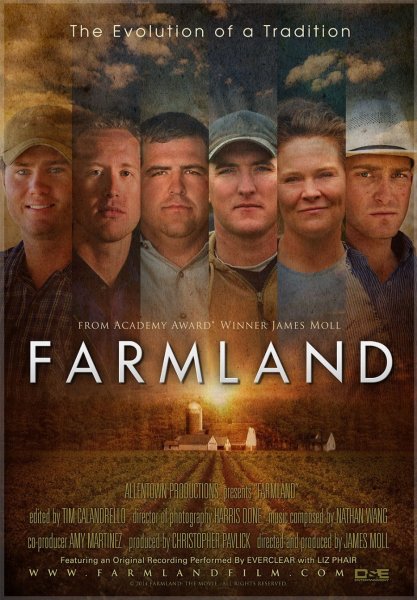
If you like this film, let us know!
Released in USA 6 april 2014
Length 1h17
Directed by James Moll
OriginUSA
Genres Documentary
Themes Environmental films, Documentary films about business, Documentary films about environmental issues
Rating62%










Farmland is a documentary film about agriculture in the United States that was funded by the U.S. Farmers and Ranchers Alliance. Six farmers and ranchers across the United States describe their experiences of and views on modern agriculture. Critics view the farmers and ranchers as sincere and what they do as interesting, but they are critical of what is left out of the documentary and that it was funded by the U.S. Farmers and Ranchers Alliance.
Synopsis
The goal of the film is to bridge the gap between food growers and food consumers by presenting farmers' and ranchers' perspectives on producing food. The film aims to do this by focusing on the lives of six farmers in their 20s who describe their experiences of and views on modern farming and ranching in the United States.Comments
Leave comment :
Suggestions of similar film to Farmland
There are 4 films with the same director, 8969 with the same cinematographic genres, 1248 films with the same themes (including 93 films with the same 3 themes than Farmland), to have finally 70 suggestions of similar films.If you liked Farmland, you will probably like those similar films :
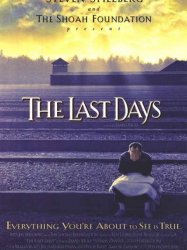
The Last Days (1998)
, 1h27Directed by James Moll
Genres Drama, War, Documentary, Historical
Themes Films about racism, Films about religion, Documentary films about racism, Documentary films about law, Documentary films about war, Documentary films about historical events, Documentaire sur une personnalité, Documentary films about religion, Political films, Films about Jews and Judaism, Documentary films about World War II
Rating78%





Le documentaire relate l'histoire de cinq juifs hongrois durant l'holocauste, en s'intéressant notamment à la vie dans les camps de concentration et au désir de vivre des prisonniers.

The Harvest Shall Come (1942)
, 33minutesOrigin United-kingdom
Genres Documentary
Themes Environmental films, Documentary films about business, Documentary films about environmental issues
Actors John Slater
The opening titles appear over scenes of farm workers stacking hay. The film opens in 1900 when Tom Grimwood as a boy leaves his family cottage carrying his trunk to take a job on a farm for a weekly wage of 2/6 plus keep.

Let It Be (2005)
Origin Taiwan
Genres Documentary
Themes Environmental films, Documentary films about business, Documentary films about environmental issues
Rating68%





This documentary records the lives of several old farmers (peasants) in Chheⁿ-liâu Village, Āu-piah (i.e., Houbi Township), Tainan County (now part of Tainan City). It generated discussion and debate in the Taiwanese civil society about the impact on agriculture due to its membership in the World Trade Organization.
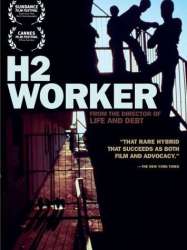
H-2 Worker (1990)
, 1h7Directed by Stéphanie Black
Origin USA
Genres Documentary
Themes Environmental films, Films about the labor movement, Documentary films about business, Documentary films about environmental issues, Documentary films about politics, Political films
Rating71%






Genres Documentary
Themes Environmental films, Documentary films about business, Documentary films about environmental issues
Rating77%





 , 1h28
, 1h28Origin USA
Genres Documentary
Themes Environmental films, Films about families, Documentary films about business, Documentary films about environmental issues, Documentaire sur une personnalité
Rating69%






Taken for a Ride (1996)
, 55minutesOrigin USA
Genres Documentary
Themes Environmental films, Transport films, Films about automobiles, Rail transport films, Documentary films about business, Documentary films about environmental issues, Documentary films about technology, Road movies
Rating78%





Taken for a Ride begins with interviews on the inefficiencies and congestion on Los Angeles' highways. Next, the film displays a variety of archival footage on streetcar systems around the United States, demonstrating that streetcars were a widespread and efficient means of transportation. The film continues into a description of the General Motors streetcar conspiracy, starting with a history of National City Lines and Pacific City Lines and General Motors' investment in both companies. The film builds the argument that streetcar systems purchased by these companies were deliberately sabotaged through service reductions and fare increases, then replaced with profitable, less convenient, bus systems. Next, the film makes a connection between this conspiracy and the construction of the Interstate Highway System and the suburbanization of America in the face of the Highway revolts in the 1960s and 1970s. The film ends with footage of the reduction of Philadelphia's trolleybus system at the time of filming.

A Cow at My Table (1998)
, 1h30Directed by Jennifer Abbott
Origin Canada
Genres Documentary
Themes Films about animals, Environmental films, Documentary films about business, Documentary films about animal rights, Documentary films about law, Documentary films about environmental issues, Documentary films about politics, Films about cows, Political films, Documentary films about nature
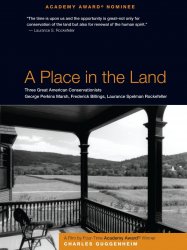
A Place in the Land (1998)
, 32minutesDirected by Charles Guggenheim
Origin USA
Genres Documentary
Themes Environmental films, Documentary films about business, Documentary films about environmental issues
Rating61%





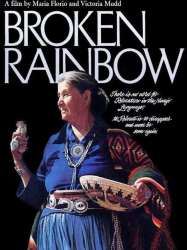
Broken Rainbow (1985)
, 1h10Origin USA
Genres Documentary, Historical
Themes Environmental films, Documentary films about business, Documentary films about law, Documentary films about environmental issues, Documentary films about historical events, Documentaire sur une personnalité, Documentary films about politics, Political films
Actors Buffy Sainte-Marie, Dennis Banks, Martin Sheen, Burgess Meredith
Rating67%





 Connection
Connection